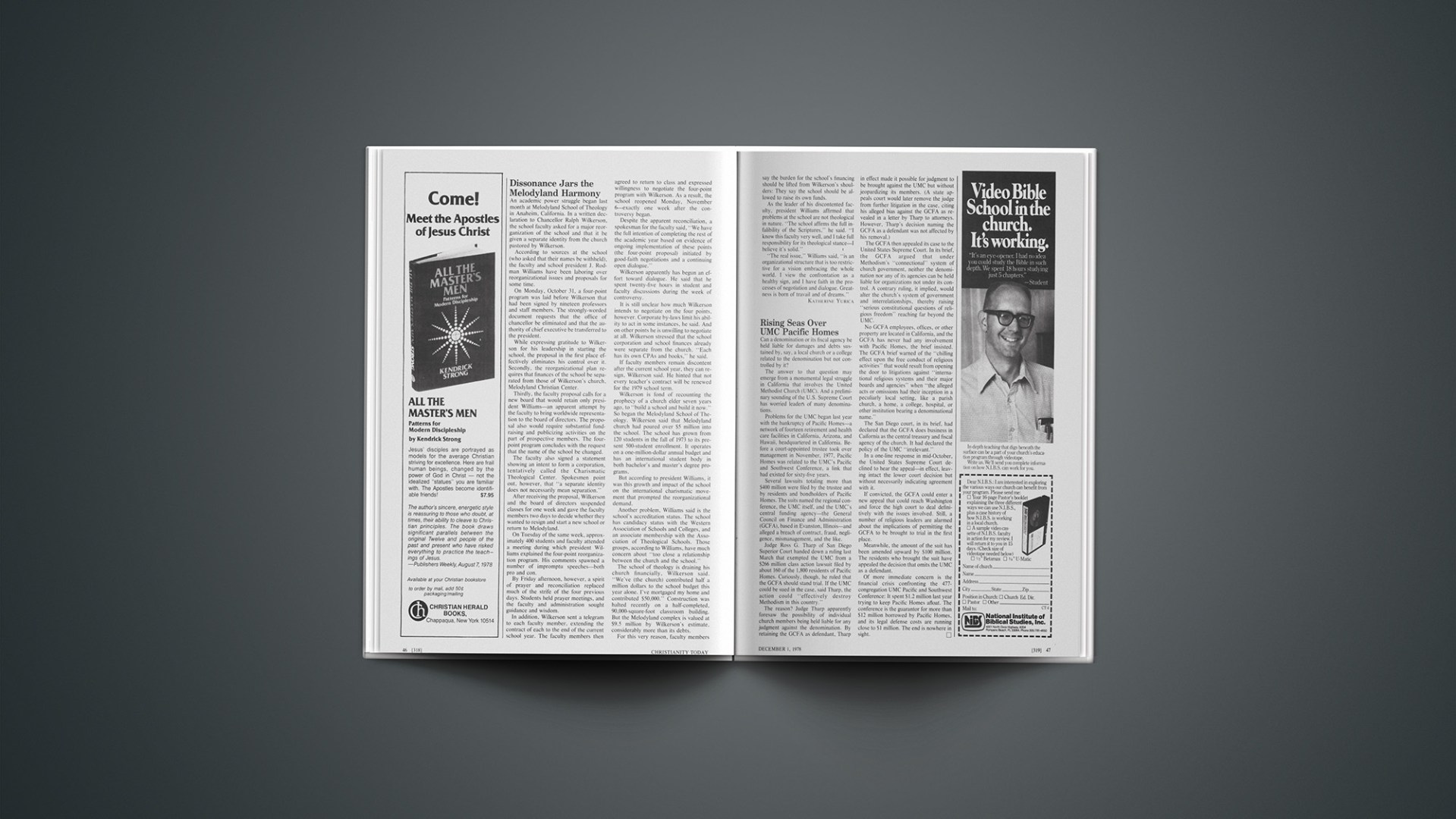Can a denomination or its fiscal agency be held liable for damages and debts sustained by, say, a local church or a college related to the denomination but not controlled by it?
The answer to that question may emerge from a monumental legal struggle in California that involves the United Methodist Church (UMC). And a preliminary sounding of the U.S. Supreme Court has worried leaders of many denominations.
Problems for the UMC began last year with the bankruptcy of Pacific Homes—a network of fourteen retirement and health care facilities in California, Arizona, and Hawaii, headquartered in California. Before a court-appointed trustee took over management in November, 1977, Pacific Homes was related to the UMC’s Pacific and Southwest Conference, a link that had existed for sixty-five years.
Several lawsuits totaling more than $400 million were filed by the trustee and by residents and bondholders of Pacific Homes. The suits named the regional conference, the UMC itself, and the UMC’s central funding agency—the General Council on Finance and Administration (GCFA), based in Evanston, Illinois—and alleged a breach of contract, fraud, negligence, mismanagement, and the like.
Judge Ross G. Tharp of San Diego Superior Court handed down a ruling last March that exempted the UMC from a $266 million class action lawsuit filed by about 160 of the 1,800 residents of Pacific Homes. Curiously, though, he ruled that the GCFA should stand trial. If the UMC could be sued in the case, said Tharp, the action could “effectively destroy Methodism in this country.”
The reason? Judge Tharp apparently foresaw the possibility of individual church members being held liable for any judgment against the denomination. By retaining the GCFA as defendant, Tharp in effect made it possible for judgment to be brought against the UMC but without jeopardizing its members. (A state appeals court would later remove the judge from further litigation in the case, citing his alleged bias against the GCFA as revealed in a letter by Tharp to attorneys. However, Tharp’s decision naming the GCFA as a defendant was not affected by his removal.)
The GCFA then appealed its case to the United States Supreme Court. In its brief, the GCFA argued that under Methodism’s “connectional” system of church government, neither the denomination nor any of its agencies can be held liable for organizations not under its control. A contrary ruling, it implied, would alter the church’s system of government and interrelationships, thereby raising “serious constitutional questions of religious freedom” reaching far beyond the UMC.
No GCFA employees, offices, or other property are located in California, and the GCFA has never had any involvement with Pacific Homes, the brief insisted. The GCFA brief warned of the “chilling effect upon the free conduct of religious activities” that would result from opening the door to litigations against “international religious systems and their major boards and agencies” when “the alleged acts or omissions had their inception in a peculiarly local setting, like a parish church, a home, a college, hospital, or other institution bearing a denominational name.”
The San Diego court, in its brief, had declared that the GCFA does business in Caifornia as the central treasury and fiscal agency of the church. It had declared the policy of the UMC “irrelevant.”
In a one-line response in mid-October, the United States Supreme Court declined to hear the appeal—in effect, leaving intact the lower court decision but without necessarily indicating agreement with it.
If convicted, the GCFA could enter a new appeal that could reach Washington and force the high court to deal definitively with the issues involved. Still, a number of religious leaders are alarmed about the implications of permitting the GCFA to be brought to trial in the first place.
Meanwhile, the amount of the suit has been amended upward by $100 million. The residents who brought the suit have appealed the decision that omits the UMC as a defendant.
Of more immediate concern is the financial crisis confronting the 477-congregation UMC Pacific and Southwest Conference: It spent $1.2 million last year trying to keep Pacific Homes afloat. The conference is the guarantor for more than $12 million borrowed by Pacific Homes, and its legal defense costs are running close to $1 million. The end is nowhere in sight.










